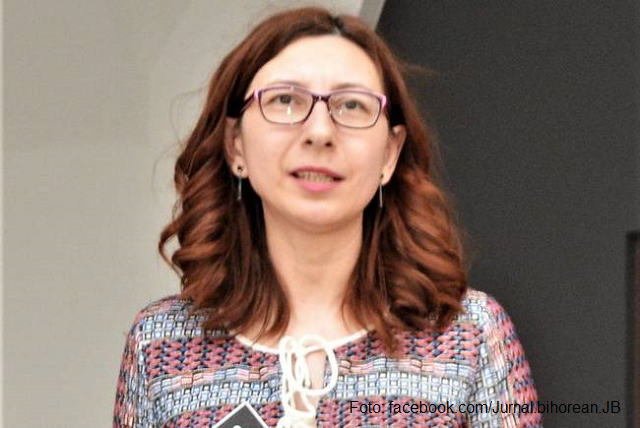Life is a
sequence of stories, in the long run. More pleasant or more thought-provoking,
meaningful or dull, stories are similar to one another and are at once
different from one another, in much the same way as human beings are. Little
wonder, then that, having to comply with the lock-down, people from all around
the world were eager to find out what kind of stories their fellow men shared.
In Oradea, a
researcher based with the Citadel Museum, having entered into the furlough
scheme at work, set for herself the task to document the period we have been
going through. Cristina Liana Puscas holds a Doctor’s degree in history. She
firmly believes that, over the years, info and images will be needed, as well
as the account of as wide a range as possible of experiences, shared by the
people who this year have been facing the pandemic. Accordingly, Cristina Liana
Puscas has generated some sort of historical research, to a certain extent
interdisciplinary, as part of the project titled Living a life in the time of
the pandemic.
The test was made of 25 questions we have created. We devised a
questionnaire made of 25 points, which we launched in the public space. We
mainly wanted to find out how Oradea-born individuals, be they from Bihor or
living abroad, who were native speakers of Romanian, have perceived this pandemic,
this incident in the history of humankind. On April 22, 2020, we launched the
questionnaire, and so far 321 people have filled it in. Of course, not all the
filled-in questionnaires we have received will be validated, for a number of
reasons. To me, the interest in that seems great, I believe 200 answers will
definitely qualify for validation. The questionnaire has been filled in online,
so it does have a drawback because of that, since those who filled it in had
access to the Internet, whereas many other people have been left out because
they couldn’t provide their answers to our questionnaire. So the answering
category, these people are university-degree respondents who also had access to
the Internet.
That is what Cristina Liana Puscas told us. Cristina also
specified she got answers countrywide, from Bihor, Satu Mare, Sălaj, Cluj,
Timiş, Arad, Bucharest, but also from New York, Vienna and Hamburg. Cristina
Liana Puscas also gave us details on the types of questions, and on the
answers.
What was the project you had to give up on, the moment you had to enter
lock-down? Quite a few of them answered they had to renounce their vacation, the
refurbishment of their homes, a new job or going to a theater show, or going to
church. Those who stayed to home or worked from home and strictly complied with
the lock-down, they have been very affected. Yet those who traveled to work,
they didn’t seem to be frustrated by the lock-down as much as the other people.
Another
question sought to find out what people found it most difficult to adapt to, under
the new lock-down circumstances. Cristina Liana Puscas:
Respondents seem to have found the lack of socialization as the hardest
thing to adapt to, they missed their siblings, their friends and even their
colleagues at work. Lock-down life was very burdensome especially for some of
the mothers, who told us the roles they were supposed to play were way too
many: they had to be schoolteachers, mothers, employees working from home,
wives, sitters, physicians, psychologists, massagists, hair stylists,
pedagogues, German or English teachers. Also, they found it hard to adapt to
the new rituals, disinfection, filling in the affidavits, giving up on having a
walk, on that freedom of movement.
For most of
the respondents, their couple lives were the least affected during lock-down,
even though some of the answers played upon such little jokes as I don’t like
to have three meals a day, or I just don’t understand why my wife tries to
organize my own life, or that is so very obvious, we have different
biological rhythms. Spending time in lock-down turns you towards the inner
world, so taking that into account, Cristina Liana Puscas devised further questions to cover that situation:
What were the little
joys that you discovered during lock-down days ? Some of them knew to make
the most of that period; they discovered the sun, sipping their coffee,
cooking, reading, gardening, and their families.
According to
an old Chinese proverb, an image is worth a thousand words, so Cristina Liana
Puscas has concurrently run a project titled Photographs during the pandemic. What did
she notice about the pictures she received?
All of them are taken from the window or from home. A window that
usually looks out on the courtyard outside. A lady sent me a photograph of
herself with her head shaved during the pandemic lock-down. A gentleman from
Satu-Mare sent me a photograph of a woman kneeling on the steps of a church.
All photographs related to home life, very few of them had to do with the outside
world.
Such projects are still ongoing, by all means. Optimism favors dreaming of better
days, yet realism prompts us to reassess what is really important for us. In
her work, Cristina Liana Puscas told us people did realize nature was very
important for them, while no less important was having the dearest ones around them.
(Translation by Eugen Nasta)
